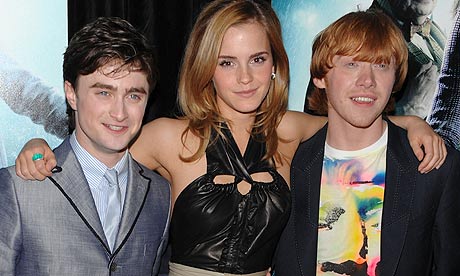I know that some of my readers are non-fans and perhaps take a haughty view of the entire series by J.K. Rowlings and filmmaking collaborators. Too bad. The books become increasingly interesting and, yes, political, as Rowlings wrote many of them during the Bush/Blair aftermath of 9/11, with Harry Potter and the Order of the Phoenix feeling particularly dark, Hogwarts under a Cheney-esque repression where rights are removed one-by-one in the name of defense. As for the movies, I wasn't a huge fan of the first two Christopher Columbus-directed flicks, as his middle-of-the-road Hollywood style has always seemed as safe as it gets. However, Columbus deserves credit for establishing the look and pace of the pictures, the mix of action and character, and most of all for whatever role he had in casting the three leads.
The difference between the first film and this one, ten years later, is the difference between this:

And this:

Much of the pleasure of the latest film is watching these kids we've followed since childhood now interacting as young adults familiar both to us and to each other. This is the funniest of the films so far, with the three main cast members garnering large audience reactions with a glance or an eyebrow due to the length of the relationships. They seem like fine, unspoiled people in real life -- Daniel Radcliffe taking a risk appearing onstage in London and on Broadway naked in Equus, Emma Watson accepted at Columbia University and considering her options, and Rupert Grint seeming very regular. Grint, in particular, appears to be the most natural of the actors and, based on his quidditch playing in this picture, appears capable of maturing into an action star to match his natural comedic talents. There's plenty of great English actors providing all kinds of pleasure in supporting roles (Jim Broadbent being the new, very welcome edition), but it's the kids who are most alright, and the focus of attention.
While I'll forever hold a special place in my cinematic heart for the third film, Harry Potter and the Prisoner of Azkaban, which thanks to the direction byAlfonso Cuarón (Y tu mamá también, Children of Men) feels more like a standalone dark fantasy classic than the two Columbus predecessors, this is a terrific cinematic experience. Multiple-Potters screenwriter Steve Kloves and second-time Potter director David Yates work wonders with the unwieldy material, but the cinematographer new to the series, Bruno Delbonnel (Amelie, Across the Universe) creates strong, brilliant images. And unlike most action blockbusters these days, the shots hold long enough to satisfy, with a minimum of shaky hand-held overcompensation.
This movie is essentially setting the table for the final two-parter, ironic considering Helena Bonham Carter (the most fun she's been since Fight Club) as the evil Bellatrix Lestrange kicks every glass and table setting to shattered pieces as she strides atop on of the long dining hall tables near the end of the picture. Arch-villain Lord Voldemort doesn't even appear in his macabre adult form in anything more than a few montage frames during a special effect. But the final mission falls into place in the last scene, where our heroes realize they've never really appreciated the beauty of their boarding school's setting.
It's childhood's end, to be sure, and assuming all goes well with the final filming this movie series will do what none other ever has, not The Lord of the Rings, not James Bond. It will have matched the full length of the literary series with watching these characters age naturally from childhood to adulthood, kind of a fantasy version of Michael Apted's documentary Up Series, which has followed a number of English children from Seven Up! and every seven years hence to the upcoming 56 Up.
How fitting that both are English endeavors -- from the nation that brought us democracy and bureaucracy -- a type of cataloging in the free world, if that's not too much of a stretch.
I look forward to seeing how it all ends.
1 comment:
Great post, Mark. The picture you have of the young actors is actually from the second film. They were even younger looking a year earlier: http://storage.people.com/jpgs/20011119/20011119-750-65.jpg
-Mark M.
Post a Comment